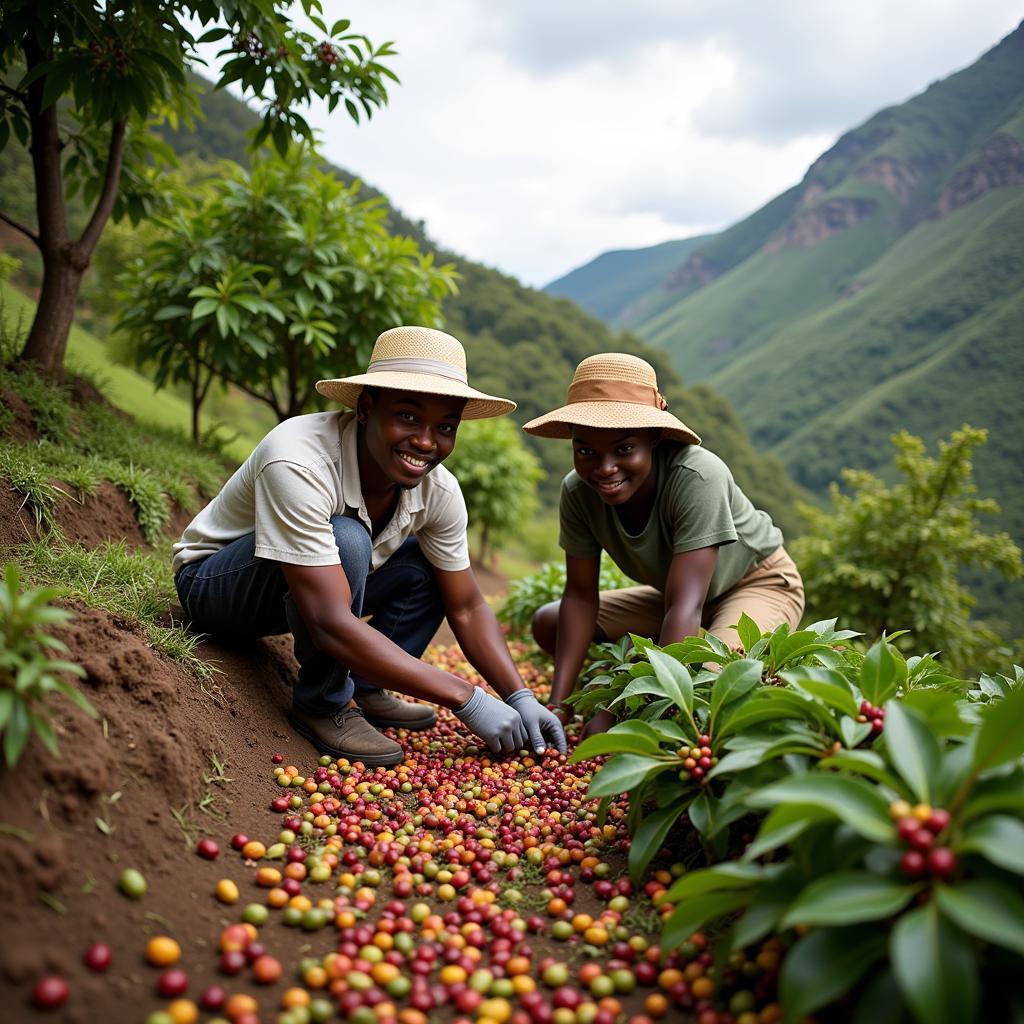African Coffee: A Journey From Bean to Cup
African Coffee is more than just a beverage; it’s an experience, a story told through every sip. From the volcanic soils of Ethiopia, where coffee is said to have originated, to the sun-drenched slopes of Tanzania, the continent produces some of the world’s most sought-after beans. This diverse landscape, coupled with unique growing practices and processing methods, results in a variety of flavor profiles that captivate coffee lovers worldwide.
The History of African Coffee: A Rich Tapestry
The story of African coffee begins in Ethiopia, where legend credits a goat herder named Kaldi with its discovery. He noticed his goats becoming unusually energetic after consuming berries from a specific tree. Intrigued, Kaldi shared his findings with local monks, who initially dismissed the berries. However, after brewing a drink with them, they experienced a newfound alertness, aiding their nighttime prayers. Word of the stimulating beverage spread, eventually reaching the Arabian Peninsula and beyond, marking the beginning of coffee’s global journey.
Ethiopia: The Birthplace of Arabica
Ethiopia is not only the birthplace of coffee but also the origin of Arabica coffee, the most popular type of coffee bean consumed globally. Grown in the highlands, Ethiopian Arabica is renowned for its floral aroma, bright acidity, and complex flavor profiles, often exhibiting notes of citrus, bergamot, and jasmine. The country’s coffee culture is deeply ingrained in its social fabric, with the traditional coffee ceremony, known as “Buna,” being an integral part of daily life, symbolizing hospitality and community.
 African Coffee Farmers
African Coffee Farmers
African Coffee Regions: A Diverse Landscape
Beyond Ethiopia, coffee thrives in numerous regions across Africa, each contributing unique characteristics to the global coffee scene.
Kenya: Where Brightness Reigns Supreme
Kenya is renowned for its high-quality coffee, characterized by its bright acidity, full body, and intense flavor. Kenyan coffee often exhibits notes of blackcurrant, blackberry, and citrus, with a characteristic winey acidity.
Tanzania: Home to Peaberry Coffee
Tanzania, home to Mount Kilimanjaro, boasts a rich coffee heritage. The country is known for its Peaberry coffee, a unique mutation where only one bean develops inside the coffee cherry, resulting in a more concentrated flavor. Tanzanian coffee is typically medium-bodied with balanced acidity, showcasing notes of chocolate, black tea, and ripe fruit.
 African Coffee Beans
African Coffee Beans
Uganda: Robusta’s Heartlan
Uganda is a major producer of Robusta coffee, known for its high caffeine content and bold, earthy flavor. While often used in blends, high-quality Ugandan Robusta is gaining recognition as a single-origin coffee, offering chocolatey and nutty notes.
The Impact of African Coffee
African coffee plays a significant role in the livelihoods of millions of people across the continent, providing employment and income for farmers, processors, and exporters. The coffee industry is vital to the economic development of many African nations, contributing significantly to their export earnings.
Sustainable Coffee Practices
As the demand for sustainable and ethically sourced coffee grows, many African coffee farmers are adopting practices that prioritize environmental conservation, fair labor standards, and community development. By supporting these initiatives, coffee enthusiasts can contribute to the well-being of both the environment and the communities that cultivate this beloved beverage.
Experiencing African Coffee
There are numerous ways to experience the diverse world of African coffee:
- Explore Single Origin Coffees: Discover the unique flavor profiles of coffee from different African countries, such as Ethiopia, Kenya, Tanzania, and Uganda.
- Attend Coffee Tastings: Engage your senses by participating in coffee tastings, where you can learn about various African coffee origins, processing methods, and flavor nuances.
- Support Fair Trade and Direct Trade Coffee: Choose coffee that is ethically sourced, ensuring fair wages and sustainable practices.
Conclusion
African coffee is a testament to the rich heritage, diverse landscapes, and hardworking people of the continent. By embracing the unique flavors and stories behind each cup, coffee lovers worldwide can embark on a sensory journey that celebrates the vibrant culture of African coffee.

